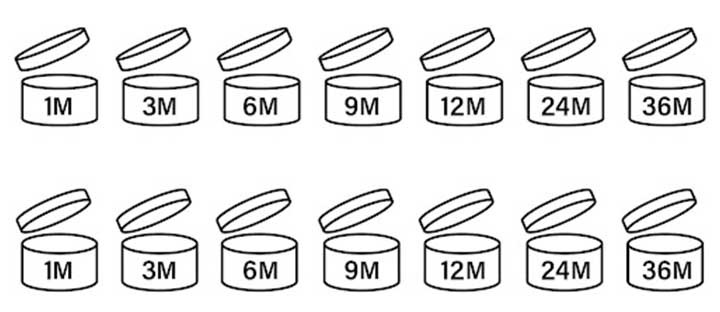When was the last time you threw away your makeup? It may have been yesterday or it may have been years ago. Let’s face it. Many of us still have eyeshadow palettes that are a few years old, while some of us may still have last summer’s foundation in our makeup drawer.
Throwing out makeup isn’t very routine for many of us, and that’s because there really isn’t much education around when to throw out makeup. Luckily for you, though, you landed here, where we’ll give you the inside scoop on makeup expiration dates and reasons to throw out certain kinds of makeup.
When Does Makeup Expire?
Whether on grocery store shelves or our refrigerator shelves, every product we purchase usually has an expiration or “use-by” date that clearly tells us when the product is no longer consumable. Plus, food like milk, cheese, and bread can spoil easily, giving us a very distinct sense of not being okay to consume anymore. But what about makeup? When was the last time you saw a foundation with a use by or expiration date? How about the last time you saw a blush palette mold or smell like funky milk? You probably haven’t. There is a huge gray area with makeup when it comes to expiration dates—in contrast with industries like food and beverage and pharmaceuticals. Believe it or not, though, there is an expiration date printed on the back of most cosmetic and skin care products—you probably just didn’t notice it. It’s called the Period After Opening (PAO) date.

What’s a PAO Date?
Run to your makeup drawer right now and pick up clean beauty products. Flip those products to the back label and see if you can identify an icon of a jar with a number in the middle. This icon is the PAO date. The number you see in the icon is the number of months the product is guaranteed to remain fresh and useable after opening. While it may not be dangerous to use expired skincare, it’s suggested to throw out makeup past its PAO date.
Also Read: What Damages The Skin If You Do Not Remove Your Makeup Before Sleeping
Is Expired Makeup Dangerous or Toxic?
Will your skin or health be harmed if you use expired skincare products? The short answer: not likely. However, this is largely dependent on the product you’re using. If you aren’t using clean beauty products, you may be exposed to the toxic chemicals in makeup, which can wreak havoc on your skin whether the product is within its expiration date or not.
However, if the makeup is expired, these toxic chemicals or contaminants like bacteria might have greater negative effects on your skin. While PAO dates can be helpful in determining when your makeup goes bad, PAO dates are just suggestions, kind of like most expiration dates on food are. But it’s still important to make sure you monitor your skin after you apply the product or patch test the product before using in order to deem it safe. If an expired product irritates your skin, you may see an increase in breakouts, redness, sensitivity or even a rash. If this occurs, it’s wise to stop using the product and see a dermatologist.

When to Throw Away Makeup and Skincare Products
Aside from following the recommendation of the PAO date on your favorite clean skincare products, there are many good reasons why you would want to throw out a product. So let’s check out a few indicators of when it’s appropriate to dispose of skincare and makeup.
The Product Is Past Its PAO Date
When you’re using a product and you notice it’s past its PAO date, ask yourself if the product is performing worse than it used to or if it’s giving you any adverse reactions. If the product still does what you need it to and your skin doesn’t break out or have a reaction, it’s probably okay to use up to six months after the PAO date. If you’re not sure if a product is still good past its PAO date, you can always spot or patch test the product on your wrist or hand.
The Product’s Packaging Is Broken or Compromised
Whether you have a product that’s expired or new and the package is damaged or tampered with, it’s best to throw out these products or take them back to where you bought them. Depending on the kind of package, damage can introduce particles and different irritants into your product. For example, a glass bottle of foundation that has a crack or a shattered corner has the potential to release tiny glass shards into the formula, which could then create small abrasions on your skin, creating the perfect environment for infection.
The Product Begins to Separate
For liquid products like lipstick, lipgloss, foundation, or lotions, it’s important to keep an eye on how the product looks. If a product is past its PAO date and the formula begins to separate, it may be time to discard this product. For powder formulations, you may notice products breaking up or changing colors, which may be an indicator that it’s time to retire the product.
Your Skin Has an Adverse Reaction
If you have been using the same products for a while now, but you start to experience adverse skin reactions or more breakouts than usual, your product may need to be thrown out. Having bad skin reactions could be a sign that your product is expired.
As you go through your makeup drawer and pay close attention to your products’ PAO dates and condition, remember to discard your products responsibly. It can feel wasteful to throw out products you haven’t finished, but it’s imperative for your skin’s health to discard products when they no longer serve you. Some products may be cleaned out and recycled, while some components of the product may need to be discarded separately or can be donated to be used for other causes. For example, you can donate cleaned mascara wands to save and take care of wild animals.
Also Read: Do Cosmetics Expire?
